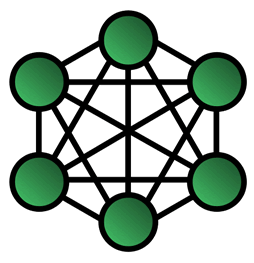Wi-Fi Mesh networks for the smallest

In a recent post, we found out that quite a large part of the audience doesn’t know what the Mesh network is, we will try to fix it.
Today we will talk about :
- What is Mesh Wi-Fi
- Full Mesh Wi-Fi network
- Why are such networks needed
- What problems does this technology solve?
- Pros and cons of mesh networks
- What technologies and protocols are used
- Comparative Table of Mesh Protocols
- Mesh networks and authorities
What is Mesh Wi-Fi

')
Mesh network is a distributed, peer-to-peer, mesh network.
Each node in it has the same powers as all the others, roughly speaking - all nodes in the network are equal.
Networks are self-organizing and customizable, the first type of network when you turn on the equipment that supports it, automatically connect to existing participants, select the best routes and self-adjust within the network.
Configurable networks are networks that should be configured before use.
Full Mesh Wi-Fi network
A full Mesh Wi-Fi network is such a network:
- To connect to which does not require any additional software except dhcp-client and support ipv6 system
Network software allows you to turn any device into a full member of the network
There is no single center for obtaining IP addresses (DHCP)
Network routes are fully distributed and dynamic.
Networking occurs in automatic mode - when the device is connected simultaneously to two networks (say from the Moscow network and to the network from the city of Khimki), the node that is connected to these two networks becomes a bridge that unites them
The standard network setting will not allow access to the normal Internet (ie, not like Tor)
Why are such networks needed
Mesh networks are quite a meaningful next step in the development of wireless networks; you are “provider to yourself” in the mesh network, you cannot be disconnected from this network, you cannot terminate the agreement on using the Internet, you cannot be overheard with
What problems does this technology solve?
This technology solves the following problems:
- Allows you to be independent from providers
- You can build your own network with a
gateway ...Wi-Fi routers and routing - To connect to the network you do not need to perform any complicated actions (provided that the network is self-configuring)
- Each new client that connects to the network increases the network’s capacity.
- The concept of "free Wi-Fi at home" is changed to "free Wi-Fi everywhere"
- If a natural disaster has occurred, then with the help of the Mesh network you can quickly build a network at the coming site for communication, with support from the outside - connect it to the global network
Pros and cons of mesh networks
Pros:
- Independence from the provider mode
- In case of natural disasters, it allows you to have a network at the scene of an accident, although it may be cut off from the global part
- Some modern protocols for the construction of Mesh networks guarantee the encryption of all traffic passing through the network (cjdns)
- Dynamic, auto-configurable routing
- The ability to combine mesh networks through the usual Internet (cjdns)
Minuses:
- The initial launch of the Mesh network is very complicated.
- Effective work is achieved when there are many participants in the network.
- Due to the lack of user-friendly Mesh resources, the network may scare off newbies.
- Non-guaranteed channel width
- Non-guaranteed call quality
What technologies and protocols are used
At present, the most popular protocols for organizing Wi-Fi Mesh networks are:
- CJDNS
- BATMAN
- DTN
- Netsukuku
- Ospf
Each has its pros and cons, which you can see in the comparison table:
Comparative table of Mesh protocols:

Auto-assignment of the address - the client chooses an address for himself and may not change it, moving from one network to another, there is no single address issuing center
Auto-conf. Routing - no need to manually configure network routing
Distributed routing - nodes exchange routing information
Networking - able to connect networks through the usual Internet
IPv4 / v6 - what protocol does the network use ?
Auto-tuning - allows you to use the network without installing any other software
Development - network development status
OS support - which operating systems can be full participants in the network
Mesh networks and authorities
For the state, Mesh networks are a twofold phenomenon; on the one hand, this type of networks allows connecting remote regions to the network with a minimal amount of investments for less money; on the other hand, traffic in such networks cannot be intercepted and analyzed.
Which side our government will adhere to will be known in the future, but already now there are many Mesh networks in the world, they are built on different protocols, they have a different community, but they work. en.wikipedia.org/wiki/List_of_wireless_community_networks_by_region
In Russia, there are no restrictions for launching Mesh Wi-Fi networks in the 2.4 GHz band habrahabr.ru/post/183474
How networks will work in the near future
At the moment, the cjdns protocol suite is most actively developed, the table above shows what it can do now.
The development of a DNS system for cjdns is also underway, which will make the domain system distributed, there is no final standard yet, but judging by all, Bitcoin will be chosen as a means to fix domain registration as soon as the DNS standard is approved in cjdns - I will definitely about it.
But everything does not end at DNS, now there is testing and development of a full-fledged Mesh network engine (the part that is responsible for automatically finding peers near and connecting to them) .
As soon as these two parts are implemented, it will be possible to say that we have a ready implementation of a set of protocols for organizing a full-fledged Mesh network.
At the moment, unfortunately, none of the available implementations can be considered as a full-fledged Mesh network due to the lack of certain functions.
More about Mesh:
cjdns
Hyperboria: Internet 2.0
Hyperboria: How it all works
Hyperboria: Routing
Netsukuku
Netsukuku - your own internet
ANDNA - Netsukuku Host Naming Service
DTN
Destructive resilient networks will soon come online
Serval (BATMAN-adv)
Subscribers will always be available
Source: https://habr.com/ru/post/196562/
All Articles